
- Free Article: No
- Contents Category: Young Adult Fiction
- Custom Article Title: Three new Young Adult novels
- Review Article: Yes
- Article Title: Cast adrift
- Article Subtitle: Three new Young Adult novels
- Online Only: No
- Custom Highlight Text:
Zach Jones’s début novel, Growing Up in Flames (Text Publishing, $19.99 pb, 288 pp), unfolds after a tragic bushfire, while an approaching bushfire stalks Carly Nugent’s protagonist Persephone in Sugar (Text Publishing, $19.99 pb, 368 pp). The only noticeable flames in Allayne Webster’s That Thing I Did (Wakefield Press, $24.95 pb, 336 pp) belong to a foul-mouthed granny named Daisy, who uses them to light her cigarettes, but Webster’s novel about an unlikely group of strangers on a madcap South Australian road trip is as poignant as it is funny.
- Featured Image (400px * 250px):
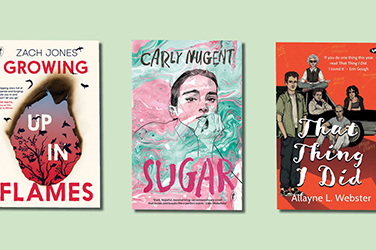
- Alt Tag (Featured Image): Ben Chandler reviews 'Growing Up in Flames' by Zach Jones, 'Sugar' by Carly Nugent, and 'That Thing I Did' by Allayne Webster
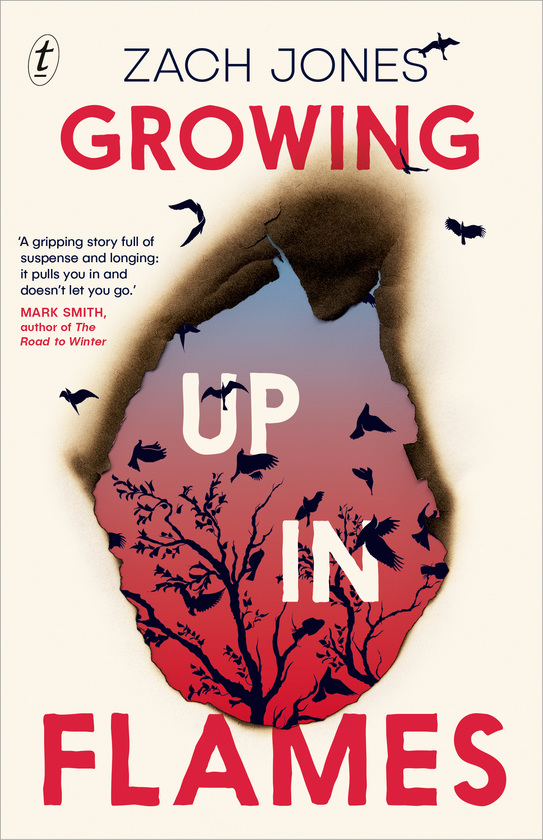 Growing Up In Flames by Zach Jones
Growing Up In Flames by Zach Jones
Text Publishing, $19.99 pb, 288 pp
Growing Up in Flames is an expertly paced book about flawed individuals trying to live with their mistakes. Jones weaves together the lives of his three protagonists: Kenna, orphaned when her single mother, Ava, dies in a bushfire; Noah, who burns down his father’s general store and struggles to support his mentally ill mother on his own; and James, who dated Ava when they were teenagers and enjoys hurting and controlling others. All three are deeply flawed, but James, narcissistic and abusive, stands out as the villain. The reader is privy to both his charming façade as he courts Ava and to his far more honest, and putrid, inner monologue. Though confronting, it’s a squalor in desperate need of exploration and exposure. Jones does so with insight and, strangely, compassion.
As Jones interrogates intergenerational trauma and the harm visited on children by their parents, through abuse, neglect, or imposing too much responsibility on their fragile shoulders, the reader begins to understand how people like James turn out the way they do, but Jones offers no excuses. He is shooting for understanding, not vindication; as much as the novel is about a desperate need to fathom how certain influences shape the people we become, at its core it’s concerned with a visceral drive to escape the inevitability of those forces. Jones asks his readers to consider what makes a monster and, beyond that, if any of them deserve a chance at redemption.
Jones’s prose is concise. Only a few early lines feel workshopped to death. The rest flow wonderfully. The metaphor of fire is employed well throughout, and Jones captures its contradictions with flair: beautiful, cleansing, and illuminating, but also destructive. Fire is the thread connecting his characters, symbolising their fears as much as their hopes. This uplifting and at times suspenseful début is a delight from start to finish.
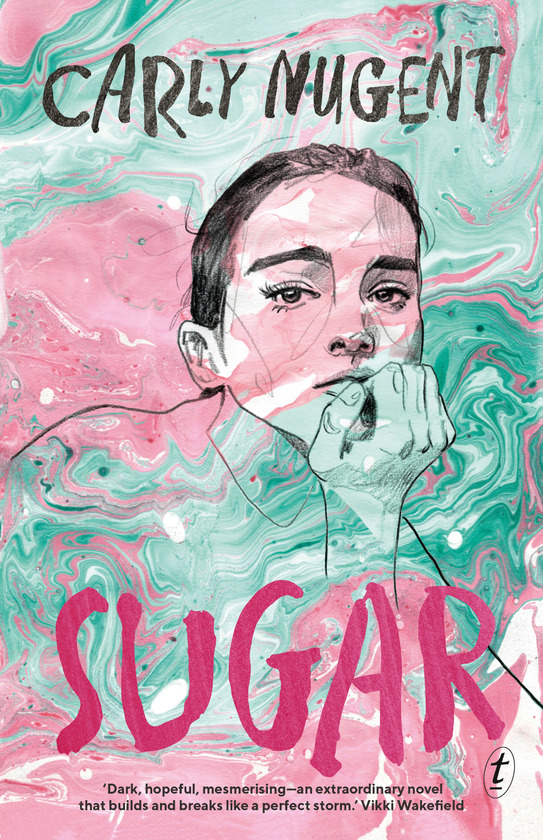 Sugar by Carly Nungent
Sugar by Carly Nungent
Text Publishing, $19.99 pb, 368 pp
Nugent’s Sugar is a slow burn. Whether it goes on too long will depend on the reader’s tolerance for adolescent self-pity. Persephone has plenty to wallow in. Her father died a year ago, her mother abandoned her for three days afterwards, and she was diagnosed with Type 1 diabetes almost immediately after that. This culminates in all her friends shunning her, though it’s tempting to blame that on Persephone’s wallowing and not, as she claims, on her diabetes. Nugent’s prose captures the drudgery of Persephone’s illness, which requires her to constantly monitor her blood sugar levels. Persephone can’t escape this monotony, and neither can the reader. It may be true to life, but it’s a big ask for Young Adult readers.
Each chapter is broken into sections demarcated by Persephone’s blood sugar reading, leaving the reader to deduce how much her actions are influenced by the amount of sugar in her system at any given time. The first section starts out at 4.0, the lowest level in the normal range. This is followed by the assertion that Persephone punched Alexander Manson in the face because he deserved it. Persephone is obsessed with people getting what they deserve. She deserves diabetes because she feels responsible for her father’s death. Alexander deserved to be punched because he called her the ‘c’ word. When Persephone finds a woman dead in the bush, she becomes fixated on discovering what the woman had done to deserve her fate, going so far as to impersonate her on social media.
Meanwhile, Persephone’s negligent mother Demi is ghost-walking through life, her Aunt Iris is on the cusp of returning to an abusive ex, her hypochondriac cousin Steven is coping suspiciously well, and she may or may not be falling in love with the somewhat nebulous character of Joseph Barnett – all this while the dry summer plods along and the threat of bushfire increases daily. The tension ratchets up, but slowly. The predictable resolutions don’t quite pay off, but Nugent’s shrewd tale of a young woman weighed down by chronic illness, struggling to make sense of a nonsensical universe, is ultimately heart-warming.
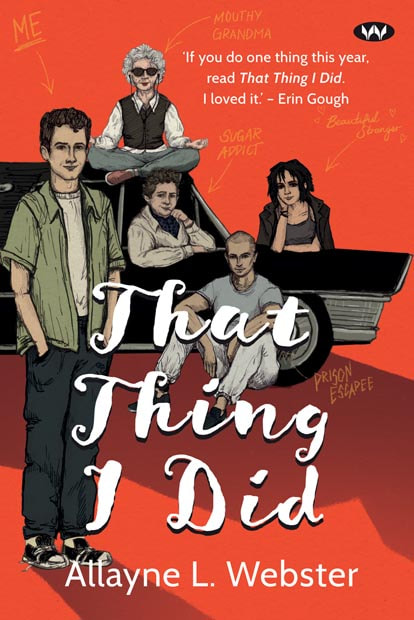 That Thing I Did by Allayne Webster
That Thing I Did by Allayne Webster
Wakefield Press, $24.95 pb, 336 pp
That Thing I Did is roaring good fun and completely bonkers. An escaped criminal with a heart of gold, a newly friendless teen obsessed with obituaries, a foul-mouth grandmother dying of cancer, and a Chupa Chup-smoking would-be pornographer who communes with the dead all pile into a hearse and embark on a road trip from the northern suburbs of Adelaide to Mount Gambier. It’s a 1980s-comedy-style set-up without all the problematic sexism, racism, or homophobia. There is a bit of nudity, though. This is mostly of the mortifying variety, as when the protagonist’s parents get a bit risqué on social media. There is also a hilarious ‘sex scene’ containing no nudity at all, and perhaps not even any sex. Teenager Taylor Kennedy posts something stupid on social media and loses all his friends because of it. He is taken under the wing of a slightly older sugar addict named Chip just before the two are kidnapped by recent prison escapee Jackson Rollock, who needs their hearse to break his grandmother out of her retirement home so that she can visit Errol, the love of her life, in Mount Gambier before she dies. Along the way they pick up the beautiful and enigmatic hitchhiker Chloe, who is on the run from her life and in need of a fast getaway.
The motley and unlikely group soon bond over moral philosophy, plenty of confessions, some shocking revelations, a few misunderstandings, and enough sugar to supply a small town for Halloween, forming first an uneasy alliance and, ultimately, a close-knit team. It is rollicking good fun, and Webster is funny throughout. Her novel is also about youth suicide. Those things should not go together, but somehow, impossibly, they do. A few of the jokes may be too parochial to strike a chord with wider audiences, but South Australians are in for a treat, and when the humour is flying this thick and fast a few missed jokes can’t spoil the fun. It is sometimes hard to believe that Webster isn’t a teenage boy. The voices of her characters, their crude humour and angsty self-doubt, are perfectly realised, and Webster has a clear respect for their insight. The action is well paced, and there’s enough heart to warm the cockles of even the snootiest of readers put off by fart jokes.
The protagonists in all three novels are cast adrift, cut off from the stable foundations that once grounded and oriented them. In their own way, each is looking backwards to the friends or family they have lost, while struggling to find a way to move forwards. Though wildly different in tone, Jones’s confident and well-crafted first novel is a revelatory examination of this maturation process, and Webster’s wonderfully outrageous, crudely perceptive offering about growing up on the road surrounded by oddball friends should not be missed.


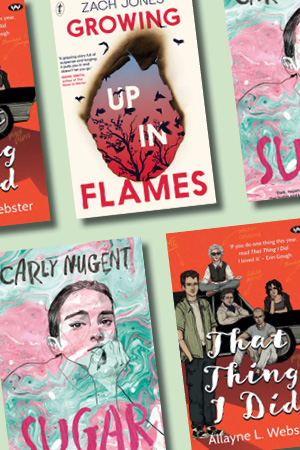
Comments powered by CComment